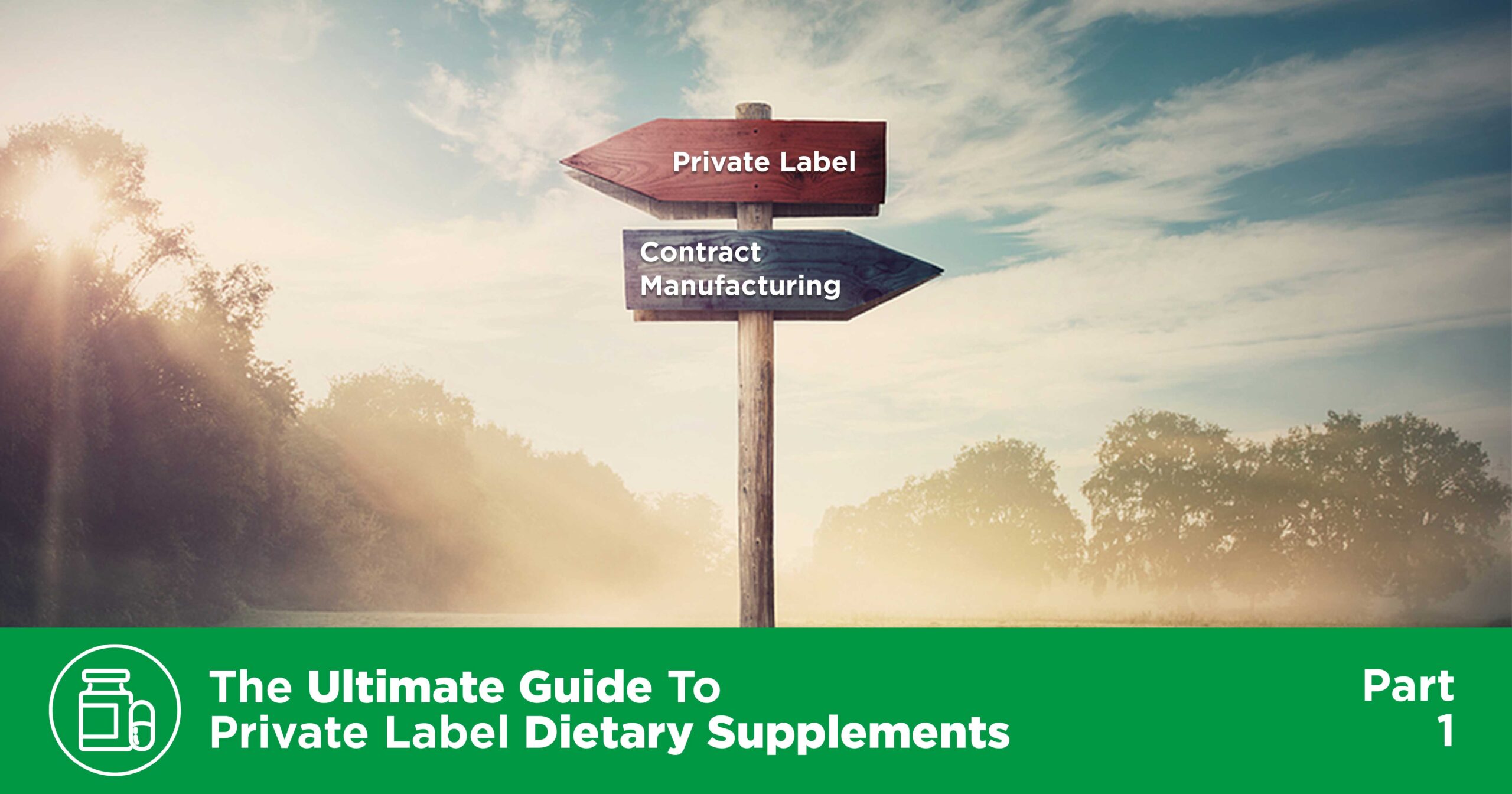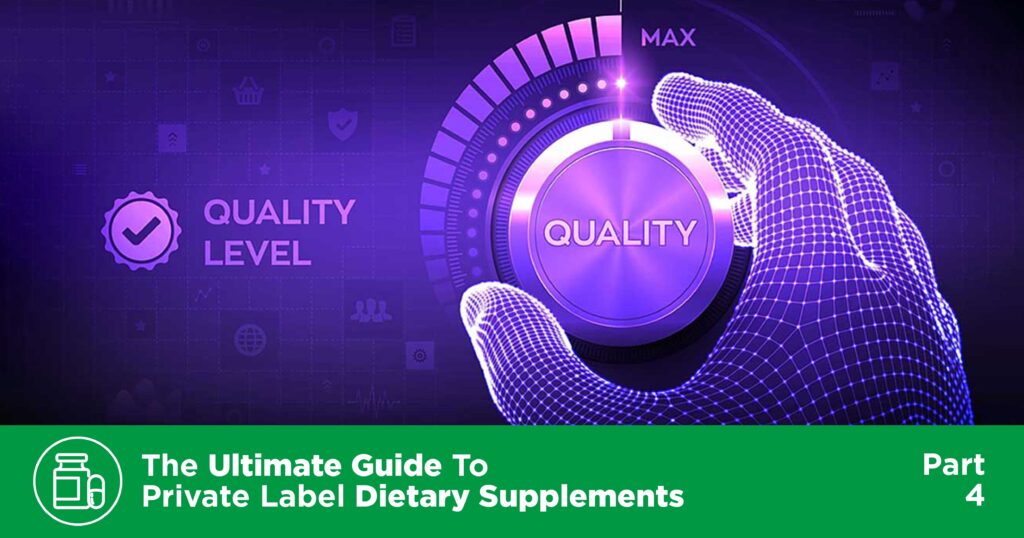This is part of our Ultimate Guide to Private Label Dietary Supplements, a complete overview of the key advantages of utilizing a private label program, the differences between private label and contract manufacturing, the biggest risks new brands might face, and the top 10 factors you should consider when choosing your private label supplement manufacturer.
We tend to get a lot of requests for “private label” supplements where the person is interested in a stock product, but in a unique flavor, a different bottle count, or a special container. This is a common misunderstanding of the differences between the benefits of a private label program and what can be accomplished through contract manufacturing. In this post, we will outline each program and how to choose between them.
How Private Label Programs Work
A private label product is generally produced by a third-party and sold by a retailer under its own brand name. The same products are available for many different businesses to purchase and rebrand. While different private label suppliers might have some small variation in the way they run these programs, the basic process is the same.
Private label products are formulated, tested, packaged, and ready for purchase by individual brands, generally in relatively low quantities. This is accomplished by taking advantage of large scheduled and standardized production runs.
In the manufacturing of a dietary supplement, there are a lot of steps that need to be taken to create a finished product. Raw ingredients need to be sourced, the product needs to be formulated to make sure it is safe and effective, and giant pieces of equipment in climate-controlled rooms need to be used. Running the equipment, cleaning the machinery and also the rooms used for different product runs, and having the appropriate personnel on-hand to operate and oversee the process takes both time and money. It only makes sense to do these runs when thousands or even millions of tablets or capsules are being produced at a time.
Typically, these products are produced in large amounts and stored at the ready for many (hundreds or sometimes thousands) of individual customers to purchase. These smaller customers are able to place orders for relatively low quantities – usually under 50 pieces, sometimes even just a dozen – and have them labeled with their own brand name. It is intended to be a smooth, quick, and low-risk process, with few barriers to entry. For this reason, it would be uncommon to be able to select a private label product “off the shelf” and then make changes to it.
In our previous post, “The Private Label Process: Optimized for Speed and Value“, we discuss in more detail the many advantages of utilizing a private label supplement program:
- Using stock products increases speed-to-market, as the products have already been made.
- Allowing individual brands to keep their inventory levels comfortable and manageable, as they are not being required to purchase thousands of units at once.
- Taking care of many of the more complicated facets of a new product launch, such as assigning the product a UPC code or the creation of an FDA-compliant label.
The biggest constraint of a private label program is that the requirement for standardization prevents customization. Changing any of the parameters of a product means specialized manufacturing runs and the loss of the economies of scale that make the private label program work. For businesses that require customization, contract manufacturing may be a better fit.
How Custom Manufacturing Programs Work
Creating a custom supplement is sometimes the preferred – or perhaps only – option.
For example, there might be a company selling an existing line of supplements where all of the labels have yellow and black stripes, and each bottle has a little bee image stamped inside of the bottle cap. The label options available for private label will probably not be able to replicate the strong “bee themed” design that is currently being used. But even if they can, the pre-packaged, sealed bottles cannot be opened back up in order to stamp the bee image inside. (That would break the safety seal.) Therefore, this would absolutely need to be a custom product, made-to-order.
A contract manufacturing program’s biggest benefit is the ability to customize so much of the product:
- Selecting the exact ingredients to be included, and in what amounts.
- Developing the formulation – optimizing the blend of ingredients for taste or price point.
- Choosing the delivery format – tablets, capsules, powders, etc.
- Designing a completely custom label.
- Determining the packaging – bottle size, color, type of seal, etc.
All these customizations can require much more of an investment by the brand: financially, timewise, and logistically.
Financially, there will be higher minimum order requirements and possibly higher costs for ingredients or custom packaging. This would most likely be less of an issue for an established company such as the one used in our “bee example”. They will probably have less of a concern with the higher minimum order requirements than a start-up or smaller company would, as they have products on the market already and probably a fair understanding of what works for them (such as how much and how quickly their products sell, most popular products among their consumer base, etc.) It’s slightly less risky because they have more experiential information than a new company would.
Timewise, they would also need to be able to wait for a longer period of time while this product is created. There would be an initial formulation to develop, based on factors such as trendy ingredients, recommended daily amounts, or how various ingredients interact with each other. Then there may be revisions required based on those findings. Then the ingredients would need to be sourced – especially if they are relatively new to the industry. Some exotic or branded ingredients might take a year to find a reliable source for, for example). Once the ingredients have been acquired, then the product would need to be tested and manufactured, making sure the material can fit into the desired capsule size, for example, or that it dissolves as it should in a glass of water. Then there is testing, to make sure the product is delivering what it claims to on the label. Last, there is the time needed to manufacture and package the product.
Logistically, as this program does not have stock products all packaged and ready for order as in the private label program, each order will be produced individually. This generally takes several months to schedule, as there is a constant queue of orders in line to be manufactured and this would be brand new.
Additionally, these orders will need to be efficiently planned for by the brand. If the order is placed too soon, there may be too much inventory to sell within the expiry date. If the order is placed too late, there is a risk of being ‘out of stock’ on an item, sometimes inviting customers to look elsewhere. Either of these scenarios could hurt the business.
It is a process, however, that is as important as it is intricate in the dietary supplement world. As more and more brands enter the market, or they begin to grow larger and want to create unique products of their own, moving to a contract manufacturing program may be the only option that makes sense.
How to Decide Which Program to Choose
Some people think that a private label product, or “stock” product, may come across as being generic or really won’t allow them to define what their brand is all about. While this CAN be true, it doesn’t have to be. This is one of the reasons why it is important to research the manufacturer beforehand and evaluate what their stock product catalog can offer, in addition to assessing the facility itself.
As we discussed in our previous post “Why Branded & Trademarked Ingredients Matter for Private Label Supplements“, there are many ways a high-quality private label manufacturer can create private label products that stand out from the crowd.
However, sometimes only a custom product will do. Larger volumes, unique packaging, or a brand-new flavor are some reasons to choose a program that will allow for such customization.
There are some manufacturers that will try to pressure a brand into creating a custom product, even if a private label program would meet the brand’s needs. There are two reasons they may do this:
- It guarantees them a larger PO. As the minimum order requirements are generally much higher when making a custom product, the manufacturer is guaranteed to make more money off of this type of order.
- Their options for stock products are limited. If the manufacturer doesn’t have “viable” options available –a large selection of products to target a variety of health conditions, products that are on-trend, using ingredients that are supported by science, products that are efficacious, or products that are unique in some way – they may try to steer a brand to create a unique product of their own.
Choosing a private label or a contract manufacturing program should come down to two things, at the end of the day:
- Do the details of the program feel comfortable? For example, are the minimum order requirements too high? Are there enough products of interest that will allow for growth with this company?
- Do I feel good about the manufacturer? In a previous post, we talked in more detail about the standards of quality certain manufacturers adhere to. It is important to view this as a relationship, and feel good about all of the partners involved.
Summary
- Private Label products, or Stock products, are pre-formulated and pre-packaged. Therefore, the products cannot be customized through this program. The minimum order requirements are smaller, and the timing to get orders is faster.
- Contract Manufacturing happens when custom orders are produced to a brand’s specifications. Customization is possible through this program. The minimum order requirements are higher, and the timing is longer.
- A private label program is usually the best option for smaller companies, brands that are just starting out, those who are looking to get products to market quickly, or those who are interested in testing out a specific product before making a larger commitment.
- Creating a custom product through a contract manufacturing program can sometimes be the best option for larger companies, established brands, or those who have a novel idea or other specification that cannot be successfully addressed by using stock products.





